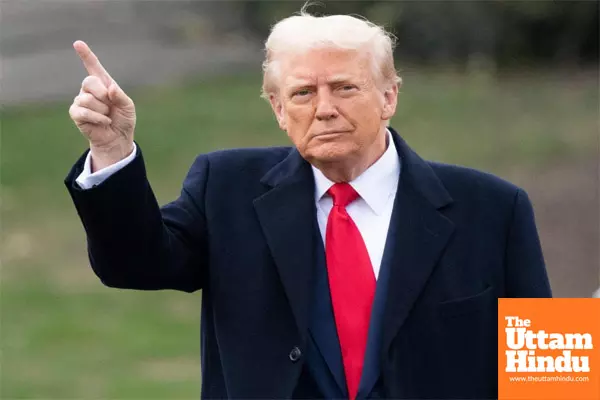
Trump Considers Travel Ban on 41 Countries, Including Pakistan, Due to Escalating Tensions.

New Delhi (The Uttam Hindu): US President Donald Trump is reportedly considering a sweeping travel ban on 41 countries, which may significantly impact nations such as Pakistan, Afghanistan and Myanmar. This proposed policy stems from an executive order issued on January 20, mandating stricter security checks for foreign nationals. The order instructed cabinet officials to submit a list of countries by March 21, recommending where travel should be fully or partially banned due to inadequate investigation and screening procedures. The goal of the ban is to strengthen US national security.
The list, which is still under review, would require approval from the administration and Secretary of State Marco Rubio. According to sources, the countries affected by the ban are divided into three groups.
First group (10 countries): A complete visa ban is proposed for countries like Afghanistan, Iran, Syria, Cuba and North Korea.
Second group (5 countries): Countries like Eritrea, Haiti, Laos, Myanmar, and South Sudan are proposed to face partial restrictions, limiting tourist, student, and some immigrant visas, though exceptions may apply.
Third group (26 countries): Countries such as Belarus, Pakistan, and Turkmenistan could face partial visa restrictions unless they address US security concerns within 60 days.
Impact on India's Neighbors
The proposed travel ban may have the largest impact on countries neighboring India, particularly Pakistan and Afghanistan. Sources suggest that Afghanistan could be included in the list for a complete ban, while Pakistan has also been recommended for inclusion. This would make it more difficult for citizens of these countries to enter the US, especially affecting refugees and Special Immigrant Visa (SIV) holders from Afghanistan following the Taliban's return to power. However, the US State Department is attempting to exempt SIV holders from the ban.
Similarities to Trump’s First Term Policy
This proposed ban mirrors the travel restrictions implemented during Trump’s first term, often referred to as the "Muslim Ban." In 2017, travel from seven predominantly Muslim countries was restricted, a decision later upheld by the US Supreme Court in 2018 after several amendments. In 2021, President Joe Biden repealed the ban, but the new travel restrictions reflect a return to a more stringent approach under Trump’s second term, fulfilling his earlier election promises.
Concerns Over International Students and Communities
The proposal has raised concerns among international students and expatriate communities. During his campaign, Trump promised to implement "ideological investigations" and prevent "dangerous radicals" from entering the country. Many American universities have already advised international students from countries like Pakistan and Afghanistan to exercise caution, as the new restrictions could make it more difficult for them to obtain US visas.
While the list is still subject to change, if implemented, it would be part of Trump’s broader immigration policy, which experts believe could harm US relations with the affected countries and exacerbate global humanitarian crises.
As tensions mount, those affected by the proposed ban are left in uncertainty, unsure of how it will shape their future in the United States.

